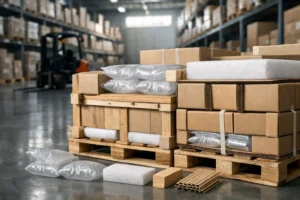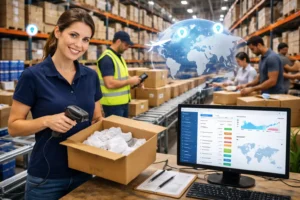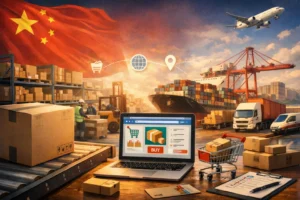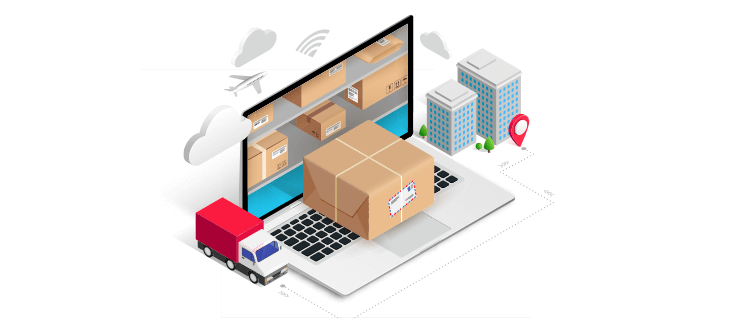
The online wholesale business is doing very well, and there are more ways than ever to get involved. In fact, experts say that in 2022, online sales will reach $1 trillion for the first time.
Whether you want to start your own wholesale ecommerce business or just want to learn more about it, this guide will tell you:
- What is wholesale ecommerce
- Different kinds of ecommerce for wholesale
- Pros and cons of ecommerce for wholesale
What is wholesale ecommerce?
Wholesale ecommerce is when goods or merchandise are sold in large quantities online at a price per unit that is lower than what is usually charged at retail stores.
Wholesale ecommerce businesses sell their products directly to customers through online marketplaces like Amazon, eBay, or Etsy, or through their own branded websites. The United States and China have the most wholesale e-commerce businesses.
Wholesale e-commerce has been around since the early days of the Internet in the 1990s. Some of the first businesses to go online were those that sold products in bulk because they could take advantage of the lower costs and reach people all over the world.
Today, businesses of all sizes are selling products to customers all over the world through ecommerce for wholesale.
There are a few important things that have helped wholesale ecommerce grow:
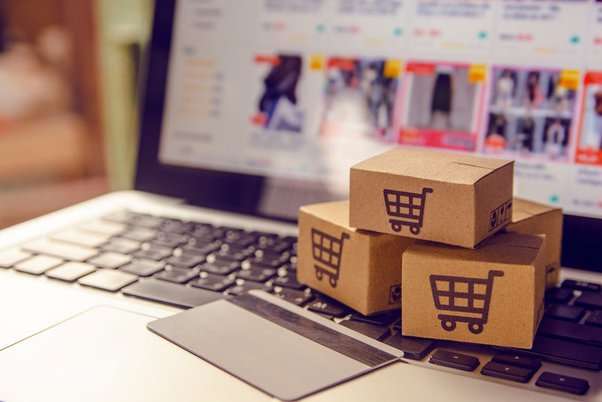
The rise of online marketplaces
Marketplaces like Amazon, eBay, and Etsy, which are all online, have made it easier for businesses to reach customers all over the world.
Social media sites like Facebook and Instagram have made it easier for businesses to connect with potential customers and build a community around their brand.
The rise of mobile commerce
Mobile commerce is the buying and selling of goods or services through mobile devices like smartphones and tablets. Businesses can reach more mobile users now that mobile devices are becoming more popular.
How Ecommerce for Wholesale Works
There are three main types of people who take part in wholesale ecommerce: wholesalers, retailers, and consumers.
Wholesalers are the companies that make or distribute the goods that retailers buy in bulk. The products are then sold to consumers by retailers, who usually charge more than what they paid the wholesaler.
People who buy things from retailers are called consumers. In wholesale ecommerce, consumers can also be businesses that buy a lot of products from wholesalers to sell to other businesses.
All three of these types of players have to work together for the wholesale ecommerce ecosystem to work.
StoreBuilder lets you sell anything, anywhere on the web.
Wholesalers need retailers to sell their products and reach consumers, and retailers need wholesalers to give them products to sell. Customers depend on retailers to sell them the things they want or need.
The goal of wholesale ecommerce is to make things easy and smooth for all three types of players.
Wholesalers should be able to find and connect with retailers online easily, and the same should be true for retailers. Wholesalers should make it easy for retailers to find and buy their products. And retailers should make it easy for customers to find and buy products.
Everyone benefits from a wholesale ecommerce ecosystem that works well and is easy to use because it makes it easier to do business and makes it more likely that each transaction will be successful.
Who can be a wholesaler?
Not every wholesaler is the same. Here are some of the most common kinds of wholesalers with whom you might work.
Merchant Wholesalers
Businesses-to-business (B2B) merchant wholesalers sell goods to other businesses. They usually buy products from manufacturers and then sell them to retailers, but they can also sell directly to other businesses.
Most merchant wholesalers have a lot of products in stock and may offer services like financing, warehousing, and shipping. Costco Wholesale, BJ’s Wholesale Club, and Sam’s Club are all examples of well-known merchant wholesalers.
Agents/Brokers
Agents and brokers are both middlemen who help buyers and sellers do business with each other. An agent acts on behalf of one party in a deal, while a broker is a third party who brings together two other parties who want to do a deal.
Real estate agents and insurance agents are common types of agents, while stockbrokers and commodities brokers are common types of brokers.
Agents and brokers both help make transactions happen, but there are some key differences between the two. One big difference is that agents usually get paid by the person they work for, while brokers usually get paid by commission.
Also, agents tend to be more specialized than brokers because they usually only work for one side in a certain kind of transaction. Lastly, agents are usually more involved in the actual deal than brokers because they often give their clients advice and help.
Sales and Getting the Word Out
Sales and fulfillment channels, also called distribution channels, are the ways that goods or services get to customers. There are many different ways to sell and distribute something, and each one has its own pros and cons.
Direct sales force is the most common type of channel. This is where representatives sell products or services directly to customers, usually in person. Distributors, retailers, and online platforms are some other common types of channels.
Every kind of channel has its own pros and cons. For example, direct sales forces tend to be very good at building relationships with customers and giving them personalized service, but they can be expensive to run.
On the other hand, distributors usually have lower prices, but they may not offer the same level of service or attention to detail. In the end, the best sales and fulfillment/distribution channel for a product or service will depend on what customers want and what the company can offer.
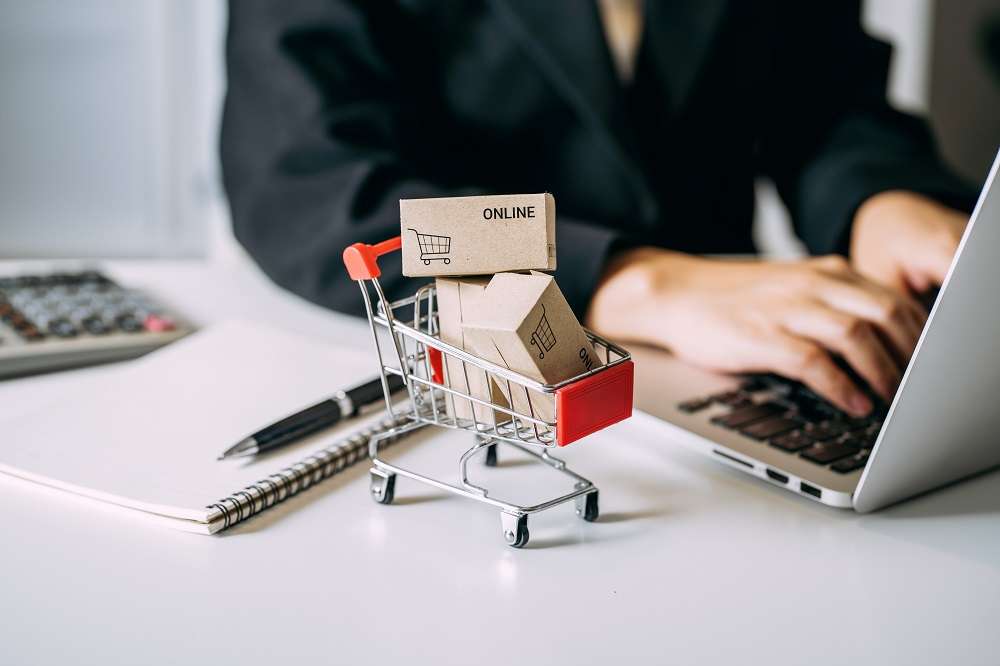
Ecommerce: Wholesale vs. Retail
There are a few major differences between wholesale and retail. Pricing, marketing, location, and fulfillment are the most important ones.
When it comes to prices, wholesale is usually a lot cheaper than retail because there is no middleman. For retailers to make a profit, they have to raise their prices. Wholesalers, on the other hand, sell at lower prices and make their money through volume.
Marketing is another area where the two types of businesses are different. Wholesalers usually grow their business through word of mouth and referrals, while retailers put more money into advertising and marketing to reach new customers.
Place is another important difference. Most wholesalers are in industrial areas or near major transportation hubs, while most retailers are in more visible places like shopping malls or streets with a lot of traffic.
Lastly, the way that wholesale and retail orders are filled is different. Most of the time, wholesalers send their goods to retailers, who then fill customer orders. Retailers often have physical stores where customers can pick up their online orders.
Why Wholesalers Need Ecommerce
Wholesale is important for e-commerce businesses because it lets them get products at lower prices. This can help them make more money and be better able to compete with other businesses.
Also, wholesalers often have access to a wider range of products than retail businesses, which gives ecommerce businesses more options.
Wholesale is also helpful because it lets ecommerce businesses get to know their suppliers better.
These connections can lead to better terms and conditions, like early access to new products or special discounts. If you have good relationships with your suppliers, it can also be easier to solve any problems that may come up.
Overall, wholesale is an important part of ecommerce because it helps businesses save money, compete better, and build strong relationships with their suppliers.
Pros and Cons of Wholesale Ecommerce
There are some problems with ecommerce for wholesale distributors. If you want to work in this niche, you should know about them before you begin. Here are some of the pros and cons of online wholesale shopping to help you make a decision.
Costs for a website can be high.
There’s no getting around the fact that website costs can be high. Even though the start-up costs might not be too bad, the costs of keeping a website up and running can quickly add up. This is especially true if you pay a professional to help you design and build your website.
Also, you may have to pay more if you want to add new features or make changes to your existing website.
Security and fraud can be a problem
There is always a chance of fraud and security problems when you deal with money. When you have an online business, it’s important to make sure that your website is safe and that your customers’ information is safe.
There have been many times when hackers broke into online businesses and stole customer information. This can hurt your reputation and also get you into a lot of trouble with the law.
There might be some physical costs.
Most of the costs of running an online business are digital, but there may be some real-world costs you need to think about.
For example, if you’re selling physical goods, you’ll need to include the cost of shipping and handling. Also, if your business grows around the world, you may need to think about storage costs.
Pros of Wholesale Ecommerce
You can cut down on overhead costs.
One of the best things about running a business online is that you can lower your overhead costs. You can save a lot of money over time because you won’t have to rent office space or hire more people.
You can market to as many people as you want.
Another benefit of having an online business is that you can reach almost anyone with your marketing. With the power of the internet, you can reach customers all over the world with just a few clicks on an ecommerce landing page. This is a great way to reach more people and make more money.
Drop-shipping is a service you can use.
You can take advantage of dropshipping suppliers if you sell physical goods. This means you don’t have to carry any inventory yourself. Instead, when a customer orders a product from your website, the order is sent to your supplier, who ships the product directly to the customer.
This saves you money on storage costs and can also help you avoid shipping delays and other problems.
Choosing a platform for selling in bulk
Now that you know some of the pros and cons of having an online business, it’s time to choose the best wholesale platform for your needs. Here are some things you should remember.
First and foremost, you should think about what you’re selling. If you want to sell physical goods, make sure that the platform you choose can meet your needs.
If you sell digital products, on the other hand, you won’t have to worry about shipping or storing inventory. This means you’ll have more choices when it comes to picking an ecommerce platform for wholesale sales.
Next, think about how much money you have. Some wholesale platforms can be expensive, so you’ll need to make sure you choose one that fits your budget.
Don’t forget to include the cost of any extra services or features you may need. For example, if you’re selling physical goods, you’ll need to include the cost of shipping and handling.
Your level of experience is another important thing to think about. If you’re just starting out, you should choose a platform that is easy to use and doesn’t require you to know anything about technology.
If you’re more experienced, on the other hand, you might be able to use a platform with more advanced features.
Lastly, you should think about what you want to do in the long run. Do you want to build a business that will last? Or are you just trying to make easy sales quickly? Your answer to this question will help you choose the best ecommerce solution for your needs by narrowing down your choices.
Final Thoughts: Ecommerce for wholesale
Wholesale ecommerce not only helps online stores give their customers great products, it also helps the economy grow. In the long run, wholesale ecommerce will be the norm.
Don’t settle for anything less than Nexcess StoreBuilder if you want to start making an ecommerce site. What is Nexcess? We give you all the tools you need to start your own online business in WordPress and grow it. Try out our StoreBuilder for 30 days for free and get started on your online dream.

